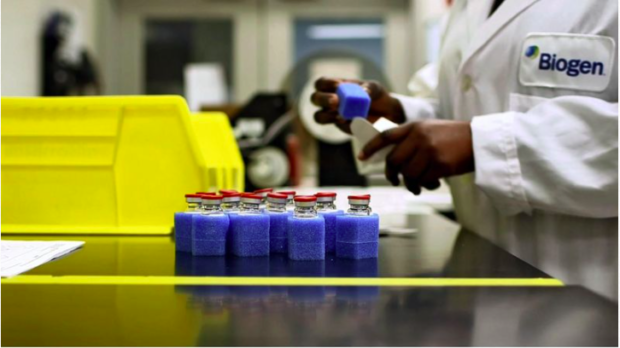
Medication is prepared for shipment at a production facility in Switzerland. Courtesy of Biogen Inc. via The Japan News/Asia News Network
TOKYO — The accelerated approval of aducanumab as a treatment for Alzheimer’s disease by the U.S. Food and Drug Administration leaves many questions unanswered — including how well it actually works.
Aducanumab could become the world’s first medication that slows the long-term progression of Alzheimer’s if it is administered in the early stages of the disease. However, additional clinical trials are necessary because uncertainty shrouds the medication’s effectiveness against Alzheimer’s disease, the most common cause of dementia.
The medication is still being studied in Japan, where 7.3 million people are forecast to be affected by Alzheimer’s disease in 2025. Other unresolved issues include the treatment’s cost and determining which patients will receive the medication.
Alzheimer’s Association Japan, an organization supporting people with Alzheimer’s and their families, welcomed the FDA’s approval of aducanumab earlier this month as “a ray of hope that opens a new door.” Morio Suzuki, representative director of the association, said, “It seems this drug can’t be used for people with advanced Alzheimer’s, but I hope this will help change the perception that it’s an incurable disease.”
Aducanumab was jointly developed by U.S. drugmaker Biogen Inc. and Japanese pharmaceutical company Eisai Co. The medication reduces accumulations in the brain of amyloid beta, a protein thought to be a cause of Alzheimer’s. Aducanumab is an antibody-drug that uses the immune system to detect and eliminate a foreign substance — in this case, amyloid beta plaques. The drug is administered intravenously once a month over an extended period.
Accumulations of amyloid beta are believed to start forming about 10 years to 20 years before the onset of Alzheimer’s symptoms. Nerve cells then become damaged, and the brain atrophies as the disease develops.
Conventional dementia medications provide only a temporary improvement in the symptoms. Experts are hoping aducanumab could prevent the disease from progressing further by eliminating amyloid beta plaques at an early stage.
However, aducanumab does not repair damaged brain cells, nor does the medication restore any decline in cognitive function.
Incomplete data
Results of the medication’s clinical trials came under intense scrutiny during the approval process. Some observers said there was “insufficient data” to make an assessment of aducanumab’s effectiveness.
At an FDA advisory committee meeting in November 2020, 10 of the 11 external experts invited to participate said the data did not show the medication was effective in treating Alzheimer’s. The other panelist voted “uncertain.”
The efficacy of a dementia medication has typically been determined by quantifying to what extent it could suppress any decline in cognitive function. However, one of the two final-stage clinical trials failed to show signs of effectiveness.
The FDA’s approval stemmed from the finding that administering the drug for 18 months to people with mild cognitive impairment or mild dementia reduced amyloid beta plaques by 59% to 71%. The agency said the medication is “reasonably likely” to provide a clinical benefit to patients. However, the medication’s effectiveness against deterioration in cognitive function was not thoroughly confirmed.
Three advisory committee members resigned in protest over the FDA’s approval of aducanumab.
The FDA said aducanumab was approved “using the accelerated approval pathway, which can be used for a drug for a serious or life-threatening illness” and seeks “to expedite the development and review of drugs that are intended to treat serious conditions where initial evidence showed the potential to address an unmet medical need.”
The agency instructed Biogen to verify the results of long-term additional testing and submit a final report in 2030. If these tests show the drug is not effective, the FDA’s approval could be revoked.
According to the U.S. Institute for Clinical and Economic Review, the FDA granted accelerated approval to 145 drugs through 2016, of which about 10% were later rescinded.
Long-term study required
Aducanumab’s clinical trials involved administering the drug for 18 months. Atsushi Iwata, head of the Tokyo Metropolitan Geriatric Medical Center’s neurology department, said, “That was cutting it fine as the length of time for being able to determine if there was any benefit.”
The tests compared the cognitive functions of people who had received the drug with those who had not, and checked whether there were any changes in their ability to live daily life independently. However, Alzheimer’s can progress slowly. Unless people with early-stage Alzheimer’s and mild symptoms are observed over a long period, pinpointing the medication’s effects is difficult.
“If additional tests are conducted over a longer period, it’s possible the effectiveness of this drug might become clearer,” said University of Tokyo Prof. Takeshi Iwatsubo, a neuropathology expert and head of the Japan Society for Dementia Research. “It seems the FDA’s accelerated approval of this drug was based on requests from society accompanying the increase in elderly people with dementia.”